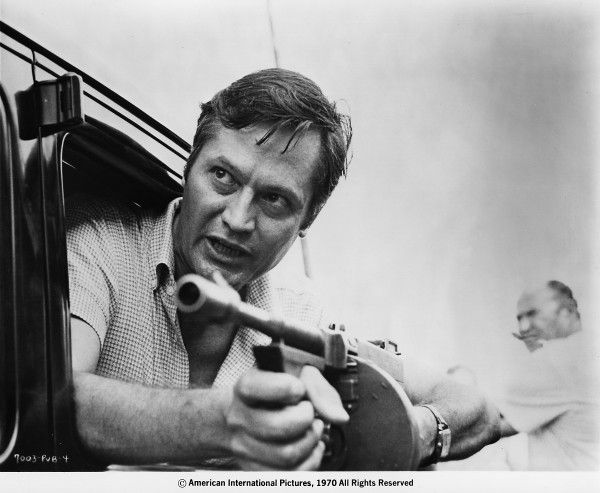Roger Corman is perhaps the most prolific and influential Hollywood filmmaker mainstream America has never heard of. Alex Stapleton’s documentary Corman’s World: Exploits of a Hollywood Rebel attempts to rectify that injustice by not only examining Corman and his filmography, but also by attempting to explain why the writer-director-producer is more than just a low-budget schlockmeister. Yes, the majority of Corman’s filmography is populated by cheap exploitation flicks, but through Stapleton’s documentary, we get a clearer picture of Corman’s contribution to American cinema. Corman’s World is a great primer on Roger Corman's filmography and an uplifting celebration of an unknown Hollywood legend.Part of Corman’s legend is that he’s credited with helping to launch the careers of well-known Hollywood luminaries like Jack Nicholson, Martin Scorsese, and Ron Howard, and they, along with others who have worked with Corman, are more than happy to talk about the man (although Bruce Dern was apparently so busy that he had to give his interview while he was getting a haircut). They all note that Corman’s demeanor is nothing like the films he directs, and in Corman’s on-camera interviews, we can see his gentle nature. It’s a charming contrast that a man who looks like he could be your kindly next door neighbor is hard at work making films like Dinoshark for the Syfy network.Despite Corman’s reputation for exploitation films, Stapleton manages to come up with a strong argument about how Corman’s films, while cheap and not “Art-with-a-Capital-Aâ€, still have their own themes and tonality. Looking at a fraction of Corman’s filmography (and it would be a chore to see pieces from all of the 394 films that he’s produced so far), Stapleton shows that Corman possesses a strong anti-authoritarian tone and colors it with irreverence. While it’s not surprising that someone who has chosen to work outside the studio system would be anti-authoritarian, the tone doesn’t arise from a vendetta against Hollywood or any deep-seated resentment. Corman jokes that before he became a filmmaker, he spent two years in the Navy and they were the worst years of his life. While the point about Corman’s tone isn’t groundbreaking, it’s noteworthy because the audience needs to understand that exploitation films aren’t necessarily soulless. The movie does a terrific job of exploring how Corman evolved over the years and why he was making certain kinds of films more than others. For example, there’s an interesting segment on Corman’s 1962 drama The Intruder. The film stars William Shatner as a white supremacist in the south. Far from the sci-fi and horror B-movies he was known for, Corman made a huge gamble by doing a film about race relations in the south during integration. According to Corman’s brother Gene (who also co-produced the film), it was their best movie and it’s the only one where they lost money. From that point, Corman decided to keep the text of his movies light and fun and keep any social commentary or weighty themes confined to the subtext (although whether he succeeded in that endeavor is a question better left to critics who are more familiar with Corman’s filmography).Stapleton then wisely expands the examination of Corman’s contribution to cinematic history by showing how without Corman, we probably wouldn’t have classics like Easy Rider or Mean Streets. The film then takes a page from Peter Biskind’s classic book on 60s-70s Hollywood, Easy Riders, Raging Bulls, by arguing that Jaws and Star Wars essentially ended not only the era of New Hollywood, but also Corman’s unique position as a master of B-movies. Corman notes that genres that were previously his forte had now become the stuff of studio tentpoles and that he couldn’t compete with the gigantic budgets being used. He also notes that the prices on these blockbusters were “obscene†and that he could achieve the same thrills for a fraction of the cost.Folks who already familiar with Corman’s work probably won’t have much to gleam from the documentary, but Corman’s fans will undoubtedly enjoy seeing the filmmaker receive his due. For the uninitiated, Corman’s World does a solid job of providing not only an overview of Corman’s career, but also provides a thoughtful look at why audiences and Hollywood owe him a debt of gratitude.Rating: BFor all of our coverage of the 2011 Sundance Film Festival, click here. Also, here are links to all of my Sundance reviews so far:
The movie does a terrific job of exploring how Corman evolved over the years and why he was making certain kinds of films more than others. For example, there’s an interesting segment on Corman’s 1962 drama The Intruder. The film stars William Shatner as a white supremacist in the south. Far from the sci-fi and horror B-movies he was known for, Corman made a huge gamble by doing a film about race relations in the south during integration. According to Corman’s brother Gene (who also co-produced the film), it was their best movie and it’s the only one where they lost money. From that point, Corman decided to keep the text of his movies light and fun and keep any social commentary or weighty themes confined to the subtext (although whether he succeeded in that endeavor is a question better left to critics who are more familiar with Corman’s filmography).Stapleton then wisely expands the examination of Corman’s contribution to cinematic history by showing how without Corman, we probably wouldn’t have classics like Easy Rider or Mean Streets. The film then takes a page from Peter Biskind’s classic book on 60s-70s Hollywood, Easy Riders, Raging Bulls, by arguing that Jaws and Star Wars essentially ended not only the era of New Hollywood, but also Corman’s unique position as a master of B-movies. Corman notes that genres that were previously his forte had now become the stuff of studio tentpoles and that he couldn’t compete with the gigantic budgets being used. He also notes that the prices on these blockbusters were “obscene†and that he could achieve the same thrills for a fraction of the cost.Folks who already familiar with Corman’s work probably won’t have much to gleam from the documentary, but Corman’s fans will undoubtedly enjoy seeing the filmmaker receive his due. For the uninitiated, Corman’s World does a solid job of providing not only an overview of Corman’s career, but also provides a thoughtful look at why audiences and Hollywood owe him a debt of gratitude.Rating: BFor all of our coverage of the 2011 Sundance Film Festival, click here. Also, here are links to all of my Sundance reviews so far:

